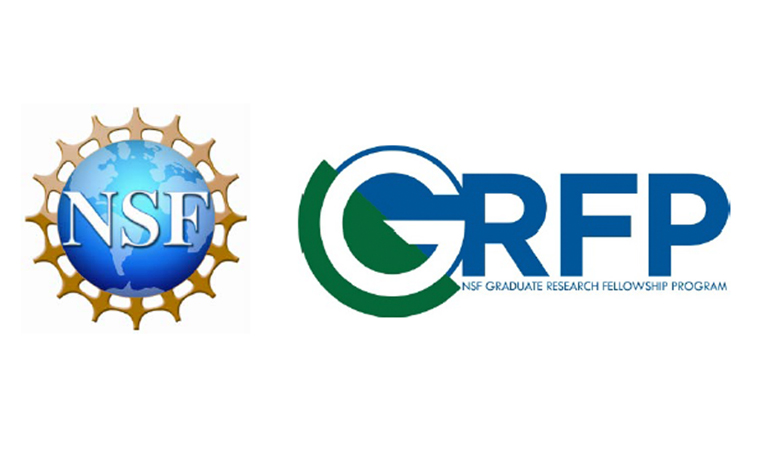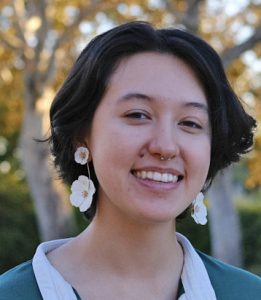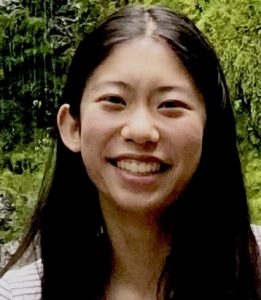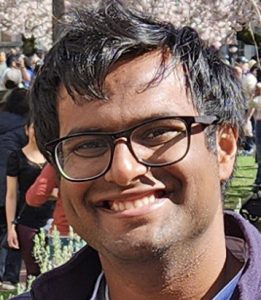Harvey Mudd College Recipients of 2023 NSF Graduate Research Fellowships
April 21, 2023
Three Harvey Mudd College seniors—Albany Blackburn, Claire Chang and Kausik Das—and seven recent graduates have been granted the National Science Foundation Graduate Research Fellowship (NSF GRF).
The NSF GRF Program recognizes and supports outstanding graduate students in NSF-supported science, technology, engineering and mathematics disciplines who are pursuing research-based master’s and doctoral degrees at accredited United States institutions. Program participants are expected to become experts who contribute significantly to research, education and innovation in the STEM fields.

Throughout most of her undergraduate career, Albany Blackburn ’23 has worked with Brian Shuve, HMC assistant professor of physics. Notably, she has investigated the sensitivity of a collider search method using long-lived particles that explore a wide range of dark matter models. For her senior thesis, she investigated the cosmological implications of a model in which dark matter interacts with normal matter via an axion-like particle. Last summer, she worked at University of Colorado Boulder with physics professor John Cumalat to test the radiation hardness of parts planned for installation into the Compact Muon Solenoid experiment at the Large Hadron Collider. During summer 2021, she studied how machine learning methods could help researchers calculate the states of neutron stars with Jeremy Holt, a nuclear theorist at Texas A&M University. She also spent a semester working with Leah Mendelson, HMC assistant professor of engineering, developing software for three-dimensional fluid flow analysis.
Blackburn’s involvement on campus includes serving as a residential life proctor, providing resources to and helping plan events for dorm residents. Through the Muchachos, she plans fun events, including Pub Trivia Night, Wednesday Nighters and, recently, human-sized Hungry, Hungry Hippos. For Muddescapes, she is creating two puzzles for a student-run escape room. She takes piano lessons and has been a tutor, especially for Physics Academic Excellence.
After graduation, Blackburn will begin graduate school at UC Berkeley, where she will pursue a PhD in physics. “I plan to study dark matter phenomenology to help connect our theories to experimental pursuits,” she says. “Further into the future, I hope to pursue a career in academia.”

Claire Chang ’23 has done research with TJ Tsai, associate professor of engineering, on signal processing. Their work on a novel algorithm culminated in a publication in the Applied Sciences Journal. The algorithm is “a variant of dynamic time warping to align two audio recordings that may contain discontinuities due to non-matching regions,” Chang says. She also worked with Susan Martonosi, HMC professor of mathematics, on an operations research project where they modeled the procurement and pricing of hexavalent pediatric vaccines for low-income countries. Her senior thesis with Jamie Haddock, HMC assistant professor of mathematics, is on the sensitivity of a Laplacian family of ranking methods. In addition to academic activities, Chang has been a grutor (grader/tutor) for the math and CS departments. She also has planned many events as the co-chair of W-ACM (the 5C chapter of the Association for Computing Machinery, supporting women in computing) and as co-president of Applied Math Club (and also as a Rewriting the Code Summer Hub Leader in Seattle). She has worked for the HMC Department of Admissions, has organized events as co-president of Stationery Club and spends her extra time at the climbing gym.
Chang will pursue a PhD in industrial engineering and operations research at Cornell University’s School of Operations Research and Information Engineering.

As part of his senior thesis, Kausik Das ’23 is modeling Janus particles in fluid under the guidance of Ali Nadim, professor of mathematics at Claremont Graduate University. He has been advised by mathematics professor Dionisios Margetis as part of a Research Experience for Undergraduates (REU) at the University of Maryland, where he studied hydrodynamic electrons in graphene. “I also worked on models for osteocytes (bone cells) with Professor Jared Barber at the Indiana University-Purdue University Indianapolis applied mathematics REU. At Harvey Mudd, I explored the motion of a dolphin tailfin at a water-air interface with Professor Leah Mendelson,” says Das.
Das is an Academic Excellence mathematics tutor and co-president of HMC’s Applied Math Club. He also has been involved with The Claremont Colleges’ Science Bus and Gateway to Exploring Mathematical Sciences. He will pursue a PhD in applied mathematics at the University of Michigan, where he plans to study mathematical modeling in fluid dynamics and materials science.
| ALUM (HMC MAJOR) | RESEARCH AREA | GRADUATE SCHOOL |
| Marcelo Almora Rios ’20 (math) | STEM Education and Learning Research- Mathematics Education | University of Montana |
| Christina Lai-Yee Lau ’21 (engineering) | Electrical and Electronic Engineering | Cornell University |
| Abel Sapirstein ’21 (mathematical & computational biology) | Industrial Engineering and Operations Research | Georgia Institute of Technology |
| Veronica L. Show ’21 (chemistry) | Materials Research- Electronic Materials | Caltech |
| Anna M. Soper ’22 (math-physics) | Physics and Astronomy- Atomic, Molecular, and Optical Physics | Stanford University |
| Sydney Emily Towell ’21 (chemistry) | Chemistry- Macromolecular, Supramolecular and Nanochemistry | University of North Carolina at Chapel Hill |
| Eli Weissler ’19 (physics) | Quantum Engineering | University of Colorado at Boulder |
The NSF Graduate Research Fellowship Program helps ensure the vitality and diversity of the nation’s base of science and engineering candidates. Fellows are seen as crucial to maintaining and advancing the nation’s technological infrastructure and national security as well as contributing to the economic well-being of society at large.
